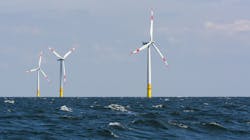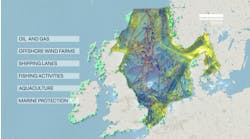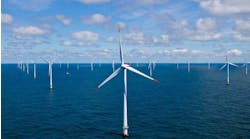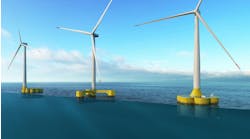RWE, Commerzbank serve smaller companies with offshore wind PPAs and fund
Offshore staff
ESSEN, Germany — RWE and Commerzbank have signed a memorandum of understanding with plans to create a "Green Mittelstand Fund" to give medium-sized industrial companies in Germany access to green electricity generated by offshore wind plants, according to a recent RWE news release.
The new fund will offer these companies (for the first time) the opportunity to secure green electricity through long-term power purchase agreements (PPAs). Up to now, it has mainly been large industrial customers that have been able to sign such long-term PPAs with large-scale green electricity projects. The medium-sized companies are offered two options as part of this fund:
- They can participate directly in the planned offshore wind farm with equity; or
- They can secure long-term green electricity via a PPA and thus achieve their decarbonization targets.
Both options can also be combined.
The planned wind farm is to have an installed capacity of about 1 GW. The companies want to apply for a seabed for the wind farm within the framework of future tenders, in accordance with the planned amendment to the German Wind Energy at Sea act. These auctions are expected to take place in 2023.
RWE plans to hold 51% of the shares in the wind farm, and the remaining 49% are to be offered to interested medium-sized companies by Commerzbank via the Green Mittelstand Fund. RWE will develop, build and operate the wind farm.
The company will commit to making the power generated there available to medium-sized companies. Commerzbank, on its part, plans to make green electricity directly available to its customers from the German Mittelstand (i.e., medium-sized companies).
On the one hand, this is to take place via individual financing and credit solutions for the equity investments of medium-sized companies in the offshore wind farm. On the other hand, the concept offers the possibility to purchase green electricity from the wind farm via PPAs starting with a tranche corresponding to a capacity of 5 MW, tailored to the electricity needs of medium-sized companies.
"We want to give these companies in particular access to green electricity production from offshore wind turbines and thus contribute to financing the energy transition in Germany," said Michael Kotzbauer, member of the board of managing directors, corporate clients with Commerzbank. “What is particularly attractive here is that our concept also offers investment opportunities in offshore wind that meet the electricity demand of medium-sized industrial companies."
German Wind Energy at Sea act to be amended
Germany needs enormous amounts of green electricity to be climate neutral by 2045, the release stated. The amendment to the German Wind Energy at Sea act therefore provides expansion targets to be increased and seabed for offshore wind to be brought forward to at least 70 GW by 2045.
To take advantage of industrial policy-related opportunities and make Germany a top location for investment in renewable energies, speed is required as well as a clear focus on supporting the economy in switching to climate-friendly production. To this end, the majority of green electricity from offshore wind must find its way into industry and the medium-sized enterprises of the German Mittelstand.
“Green electricity at competitive prices is the pledge of a sustainable industrial nation with a strong tradition of the Mittelstand," said Ulf Kerstin, RWE's chief commercial officer offshore wind. "Our concept opens up great opportunities for this because it can support companies and the energy transition. However, the amendment to the legislation should be modified in such a way that it really does give a boost to the transformation of Germany as an industrial location because electricity from offshore can be offered at competitive prices.”
One prerequisite for this is to dispense with the negative bidding component, which the current draft law provides for, when designing the bidding conditions for offshore wind turbines on so-called non-pre-surveyed areas, the release stated. This bid component would make green electricity unnecessarily more expensive for German companies, which are already facing record high energy prices. There is also a need for improvements in the criteria for the award procedure. They should be chosen in such a way that they allow differentiation between the bids and at the same time serve the overriding goal of providing green electricity in a smart and system-serving way, according to the RWE relase.
06.20.2022



